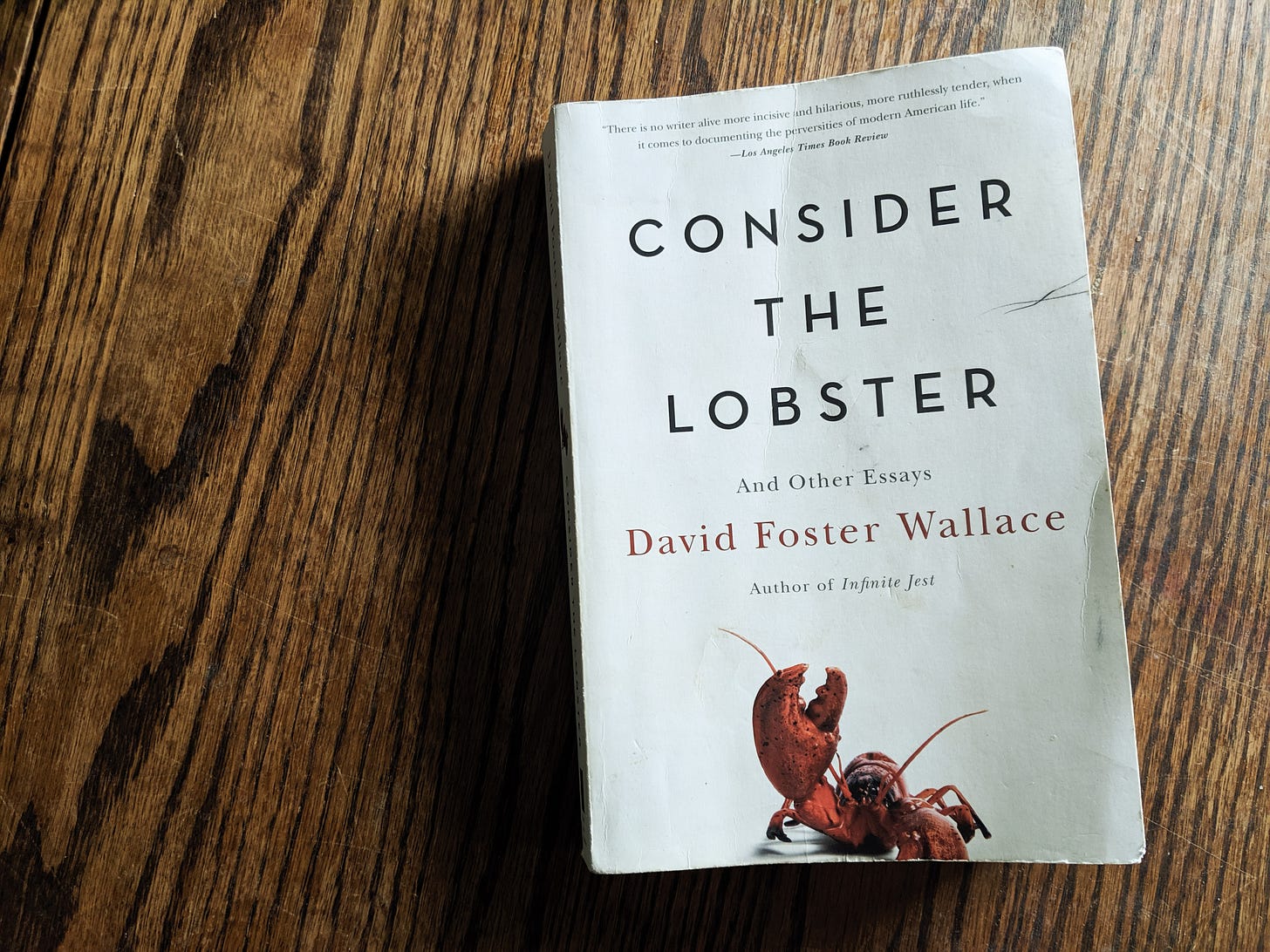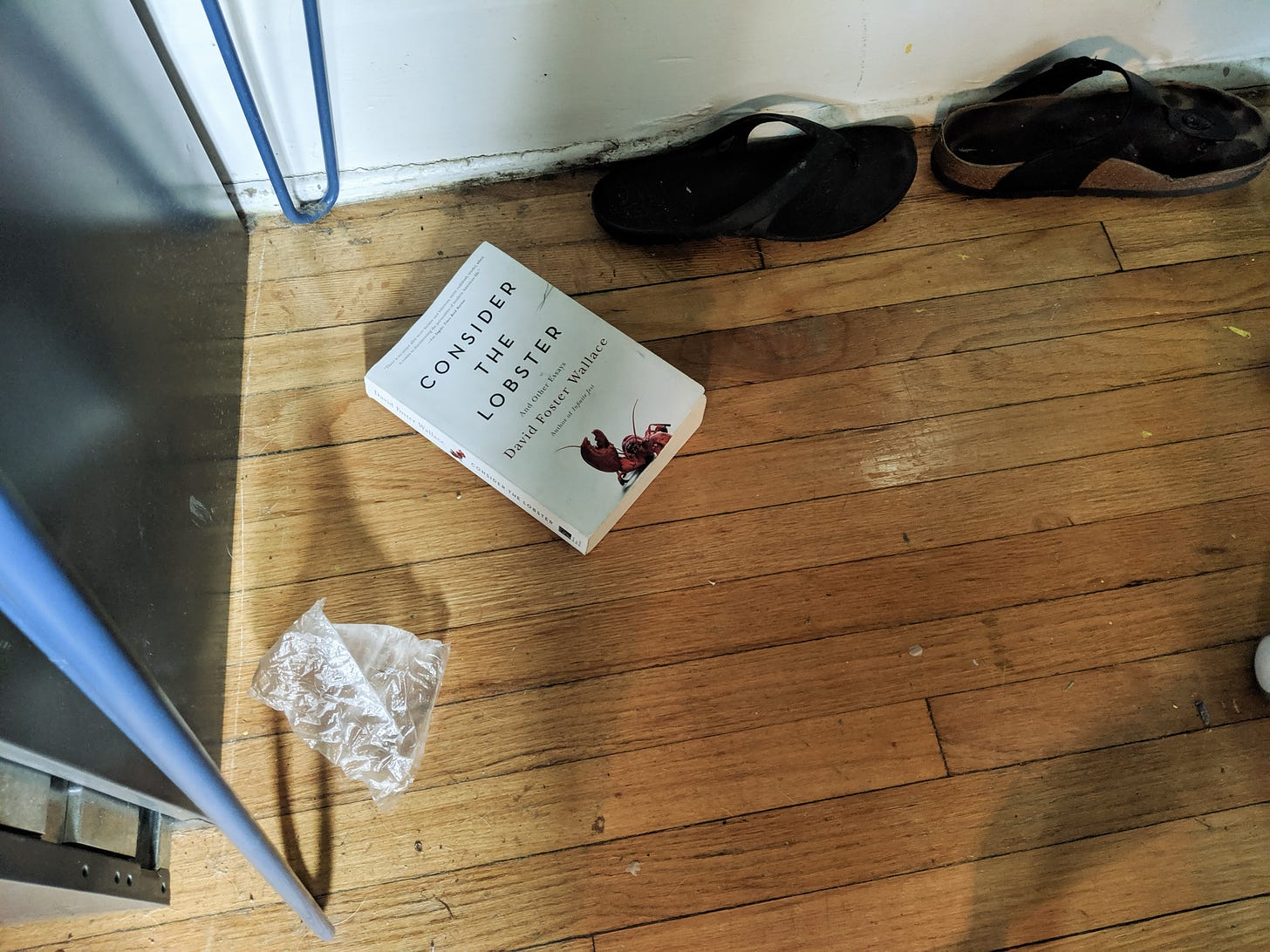
Image: A worn copy of Consider the Lobster And Other Essays on a scarred wooden table. Credit: Kat Eschner
I didn't really know who David Foster Wallace was until a couple of years ago. I think maybe I read something of his back in high school, but then again it might have been written by Thomas Pynchon. Really, it’s kind of amazing that adolescent Kat escaped awareness of his literary reputation. After all, I was a fetishistically bookish young person and I grew up during his heyday in the late twentieth century and early twenty-first.
My ignorance lasted all the way until 2016. When I was working on my first story about animal rights, a friend mentioned "Consider the Lobster," Wallace’s ethnography of the 2003 Maine Lobster Festival. I opened the essay, which was published in the now-defunct Gourmet, in a tab that ultimately went unread and filed the story, which was about dogs. In time, I included a copy of Consider the Lobster and Other Essays in an Amazon order, alongside a style guide and just after ordering a double sleeping bag.
It showed up. I didn't read it. It sat around, migrating from desk to night table to bookshelf and then to the pile of mulch under my desk. I didn't read it some more.
Then in late 2017 or early 2018, trying to knock myself out of a period of mental fog, I read several of its essays in about two days. I read "Up, Simba," which is about John McCain's 2000 presidential run as told from the perspective of the grizzled journalists on the press bus. I read "How Tracy Austin Broke My Heart," which is ostensibly about a disappointing tennis memoir but is actually about the highest price of talent–self-knowledge.
But before I got to the one piece he wrote that I genuinely wanted to engage with—the goal of the purchase—I decided not to read any more David Foster Wallace for a while. If you had visited my apartment and dug around for my copy of Lobster, you would have found the dogear on the first page of the eponymous essay.
Understand, I don't care very much about John McCain and the meaning of American heroism or Tracy Austin and the way she could either be a prodigy or know what it means to be a prodigy but not both. They're interesting things, and sometimes as I was reading these essays I underlined something or made a note in the margins, but I didn’t care very much at all.
I do care about how we live with animals. And I care about myself. Both of these things go some way towards explaining why I didn’t make time to read “Consider the Lobster.”

Image: The same copy of Consider the Lobster lies amidst detritus under my desk, including a mismatched pair of flipflops. Credit: Kat Eschner
I personally don’t think David Foster Wallace was the greatest writer of his generation, a superlative granted him after his death by suicide that has been debated ever since. He was, however, a very influential writer of his generation. When I finally read Wallace I could see that influence in my own style. I don’t write as well as him, but I do write sort of like he did.
If writers were livestock, our names would appear in the same herdbook. This shared heritage ranges forwards and backwards in time, from writers who were influenced by Wallace or who influenced him, from my teenaged self’s writing mentor to me. He (the mentor, who was a teacher at my high school) recommended Gaiman, Pynchon, Richler, Hesse, Palahniuk. I read Updike and Steinbeck, Franzen, Nabokov, Fitzgerald.
Like most young people, I read the books that older people who I trusted told me were good and attempted to also find them good. So when I finally came to Wallace, a rapport had already been established. Somehow we were connected by what we read and how we wrote. It makes me uneasy.
He could be shitty to women. In this, he has never been alone on my bookshelf. I read other writers, especially male writers, who fucked their students or abused their partners. Many of them are good with words, innovative with forms, funny in one way or another. Why wouldn’t they be? Their work had the space to flourish, often at the cost of others.
The difference with Wallace lies in the fact that I first encountered him as an adult, after I learned to be much, much more wary of the canon. I have work, now, too—work I need to protect. “Consider the Lobster” is obviously connected to that work, and that’s why I didn’t want to read it.
In the year or so between making that dogear and finally reading the essay, I read a lot of things about David Foster Wallace that made me leery of giving him more mental real estate. I read about him stalking an ex-partner. I read about him sleeping with students. I read about the shitty female characters he crafted in books I’ll likely never read.
An anecdote, in which I am 17: I’m sitting with the mentor previously mentioned (See? You knew where this was going. Both fiction and non-fiction have trained you well) on the Seawall at Stanley Park by Siwash Rock. My feet are bleeding, a consequence of an ill-advised walk on barnacle-covered rocks. “I would really like to kiss you,” he says. “You can say no.”
That night, as we sit facing each other in a diner, he will say to the waitress, “My wife was just looking at your shoes,” and we will make eye contact that I cannot forget, although not for lack of trying. In this moment, he will think all that has happened was right and so will I.
I cannot draw a direct connection between this predictable little tale and David Foster Wallace, but I know it’s there. I can smell it. A canon full of hideous men (or white people, or straight people) is inherently permissive: you can do hideous things, it says, and still possess greatness. It follows that these things are okay, and any negative feelings that may arise from them are misguided.
When I read Wallace I feel like I’m reading a warmly written letter from a colleague. His particular skills and writerly quirks—call it the New Sincerity, as critics did—invite this interpretation. But when I take a step back, he’s never writing to me.
Such is the case with so many of our shared influences whose actions lead me to question the degree to which they actually saw women as people. What can I take from their words, and what must I guard against? What have I already metabolized? This is a problem of reading that I have always lived with, usually unthinkingly.

Image: Consider the Lobster nests among other books and magazines on my bookshelf. Credit: Kat Eschner
I finally read “Consider the Lobster” at the end of January 2019, and then I wrote the first draft of this essay, showed it to a few people and put it in a drawer. It is now December 5, 2019.
A man goes to a lobster festival and asks, “Is it all right to boil a sentient creature alive just for our gustatory pleasure?”
We will never know for certain whether other beings feel what we’d call pain, he says, and any scientific insight is just a proxy for true, one hundred percent, first-person subjective understanding.
“Still, after all the abstract intellection, there remain the facts of the frantically clanking lid, the pathetic clinging to the edge of the pot,” he writes. “Standing at the stove, it is hard to deny in any meaningful way that this is a living creature experiencing pain and wishing to avoid/escape the painful experience.”
Either you think lobsters feel pain, or you think they are having a purely physiological response that has nothing to do with what humans would call pain. In either case, if you have elected to attend the Maine Lobster Festival, you eat them.
Of course, most of the time people in the West don’t see food animals live or die. It all happens somewhere else. The bigger question Wallace poses is about what this might mean, and why we might want to think about it. Most of the time, it’s convenient to ignore this ethical problem—a convenience furnished by the hidden labor of people and animals in our food system.
It was convenient for Wallace to refrain from publically struggling with his treatment of women the way he struggles with the consumption of lobster. I’ve certainly done things that are convenient: after all, Consider the Lobster reached me via an Amazon order. I bought it and then I didn’t read it, because I knew doing so would force me to contemplate a time when I, too, was a convenience.
The pain caused to other beings in a life is often not as clearly expressed as the frantic scramblings of dying lobsters. A consolation of sorts: I have no doubt that the lobsters, if it was convenient for them, would boil us alive too.
I don’t know if lobsters feel pain the same way I don’t know if David Foster Wallace felt pain. Any distinction between these two knowledges is just a matter of degrees; I am taxonomically closer to Wallace than to a lobster. It’s still no replacement for true, one hundred percent, first-person subjective understanding.
There’s something truly disgusting here, and it’s probably in the details. Wallace had a knack for details, right down to the clanking lid—although if you want to know all the gory, predictable truths “Consider the Lobster” has to offer, you will have to read it for yourself. It’s good. I recommend it.
This essay was written by Kat Eschner and edited by Josh Roiland, Tracey Lindeman, Rachel Feltman and others.
Questions? Comments? Compliments? Complaints? Contact me at my email or on Twitter. If you enjoy this newsletter and would like to tip me, I am on Ko-fi.
All images in CREATURE FEATURE are used under Creative Commons licensing. Efforts have been made to ensure that photographs of living animals or natural scenes have been taken ethically, in responsible pet ownership conditions, at AZA-accredited zoos and aquariums or under safe, non-damaging conditions in the wild. If you see an issue with any image we share, please notify me.


